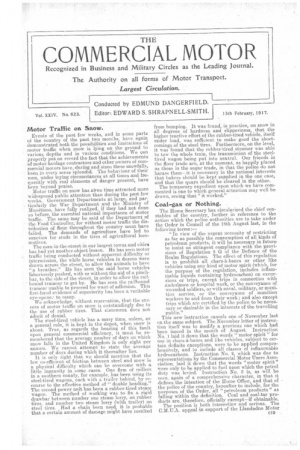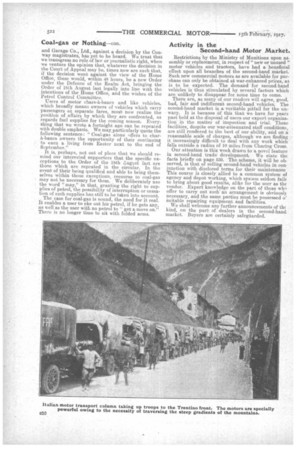Motor Traffic on Snow.
Page 1

Page 2

If you've noticed an error in this article please click here to report it so we can fix it.
Events of the past few weeks, and in some parts of the country of the past two months, have again demonstrated both the possibilities and limitations of motor traffic when snow is lying on the ground to various depths and in various conditions. We can properly put on record the fact that the achievements of motor-haulage contractors and other owners of commercial motors have, during and since these snowfalls, been in every sense splendid. The behaviour of their men, under trying circumstances at all times and fre quently with real elements of danger present, have been beyond praise.
• Motor traffic on snow has ateno time attracted more widespread public attention than during the past few -weeks. Government Departments at large, and particularly the War Department and the Ministry of Munitions, have fully realized, if they had not done so before, the essential national importance of motor traffic. The same may be said of the Department of
• the Food Controller, for without motor traffic the distribution of flour throughout the country must have failed. The demands of agriculture have led to sanction for studs in the tires of agricultural locomotives.
The man-in-the-street in our largest towns and cities has had yet another object lesson. He has seen motor traffic being conducted without apparent difficulty or intermission, the while horse vehicles in dozens were drawn across the street, to allow the animals to have " a breather." He has seen the. said horse vehicles laboriously pushed, with or without the aid of a pinchbar, to the side of the street, in order to allow the rail' bound tramcar to get by. lie has seen the rai-lbound tramcar unable to proceed for want of adhesion. This first-hand evidence of superiority has been a veritable eye-opene: to many. We acknowledge, without reservaticin, that. the success of motor traffic on snow ie outstandingly due to the use of rubber tiros. That statement does not admit of denial.
• The steel-tired vehicle has a sorry time, unless, as a general rule, it is kept in the depot, when snow is about. True, as regards the bearing of this fault upon general commercial efficiency, it. must be remembered that the average number of days on which snow fails in the United Kingdom is only eight per annum. We 'cannot attempt to state the average number of days during which it thereafter lies.
It is only right that we should mention that the
• low co-efficient of friction between steel and snow is a physical difficulty which can be overcome with a little ingenuity in some cases. One firm of millers in a southern county, for example, has been using its steel-tired wagons, each with a trailer behind, by recourse to the effective method of -" double heading." The second power unit has been a rubber-tired steam wagon. The method of working was to fix a rigid drawbar between number one steam lorry, on rubber tires, and number two steam lorry (with trailer) on steel tires. Had a chain been used, it is probable that a certain amount of damage might have resulted
from bumping. It was found, in practice, on snow in all degrees of hardness and slipperiness, that the higher tractive effort of the rubber-tired vehicle, itself tinder load, was sufficient to make good the shortcomings of the steel tires. Furthermore, on the level, it was found that the rubber-tired steamer was able to tow the whole train, the transmission of the steeltired wagon being put into neutral. Our friends in the flour trade are, at the moment, as happily placed as those in the sugar trade, in that the police do not harass them—it is necessary in the national interests that bakers should be kept supplied in the one case, and that the quays should be cleared in the other. The temporary expedient upon which we have commented is one to which general attention may well be drawn, seeing that "it worked!'
Coal-gas or Nothing.
The Home Secretary has circularized the chief constables of the country, further in reference to the action which the police authorities are to take under the Order in Council of the 18th August last, in the following terms:— "In view of the urgent necessity of restricting
as far as possible the consumption of all kinds of petroleum prodUcts, it will be necessary in future to insist on stringent compliance with the provisions of Regulation 8 G of the Defence of the Realm Regulations. Thc effect of this regulation is to prohibit all chars-hebancs or other like vehicles using any kind of motor spirit (which, for the purpose of the regulation, includes inflammable liquids containing hydrocarbon) on excursions or trips, except trips in connection with ambulance or hospital work, or the conveyance of wounded soldiers, or with naval, military, or munition service, or the conveyance of munition workers to and from their work ; and also except trips which are certified by the police to be necessary or desirable in the interests of the travelling public."
This new instruction cancels one of November last on the same subject. The November letter of instruction itself was to modify a previous one which had been issued in the month of August. Instruction No. 1 laid it down that the words "motor spirit" for use in chars-a-banes and like vehicles, subject to certain definite exceptions, were to be applied comprehensively, and to include all classes of inflammable hydrocarbons. Instruction No. 2, which was due to representations by the Commercial Motor Users Association, laid it down that the words "motor spirit" were only to be applied to fuel upon which the petrol duty was levied. Instruction No. 3 ii, as will be seen, again of a comprehensive character, in that it defines the intention of the Home Office, and that of the police of the country, hereafter to include, for the purposes of the Order, all "petroleum products" as falling within the definition. Coal and coal-tar products are, therefore officially exempt—if obtainable. The position is both interesting and serious. The C.M.U.A. appeal in support of the Llandudno Motor
and Garage Co., Ltd., against a decision by the Conway magistrates, has yet to be heard. We trust that we transgress no rule of law or journalistic right, when we venture the opinion that, whatever the decision in the Court of Appeal may be, times now are such that, if the decision went against the view of the Home Office, there would, within 48 hourse a new Order A under the Defence of the Realm Act, bringing the Order of 18th August last legally into line with the intentions of the Home Office, and the wishes of the Petrol Control Committee.
Users of motor chars-k-bancs and like vehicles, which broadly means owners of vehicles which carry passengers at separate fares, must now realize the position of affairs by which they are confronted, as regards fuel supplies for the coming season. Everything that we wrote a fortnight ago can be repeated with double emphasis. We mayparticularly quote the following sentence: "Coal-gas alone offers to charbebancs owners the opportunity of their eontinuing to earn a living from Easter next to the end of September."
It is, perhaps, not out of place that we should remind our interested supporters that the specific exceptions to the Order of the 18th August last are those which are repeated in the circular. In the event of their being qualified and able to bring themselves within those exception's, recourse to coal-gas may not be necessary for them. We deliberately use the word "may," in that, granting the right to supplies of petrol, the possibility of interruption or cessa
tion of such supplies has still to be taken into account. , The case for coal-gas is sound, the need for it real. It enables a user to eke out his petrol, if he gets any, as well as the user with no petrol to " get a move on." There is no longer time to sit with folded arms.
Activity in the Second-hand Motor Market.
Restrictions by the Ministry of Munitions upon assembly or replacement, in respect of" new or unused" motor vehicles and tractors, have had a beneficial effect upon all branches of the second-hand market. Such new commercial motors as are available for purchase can only be obtained at war-enhanced prices, as is to be expected. The demand for secondhand vehicles is thus stimulated by several factors which are unlikely to disappear. for some time to come.
There are, as many of our readers will agree, good, bad, fair and indifferent second-hand vehicles. The second-hand market is a veritable pitfall for the unwary. It is because of this that wehave for years past held at the disposal of users uur expert organization in the matter of inspection and trial. These facilities, despite our war-attenuated staff conditions, are still rendered to the best of our ability, and on a reasonable scale of charges, although we are finding it increasingly difficult to deal with any work which falls outside a radius of 10 miles from Charing Cross. . Our attention is this week drawn to a novel feature in second-hand trade development. We state the facts briefly on page 530. The scheme, it will be observed, is that of selling-second-hand vehicles in conjunction with disclosed terms for their maintenanoe This course is closely allied to a common system of agency and depot working, which system seldom fails to bring about good results, alike for the user as the vendor. Expert knowledge on the part of those why: offer to Garry out such an arrangement is abviously necessary, and the same parties must. be possessed o' suitable repairing equipment and facilities.
We shall welcome any further announcements of the kind, on the part of dealers in the second-hand market. Buyers are certainly safeguarded.






















